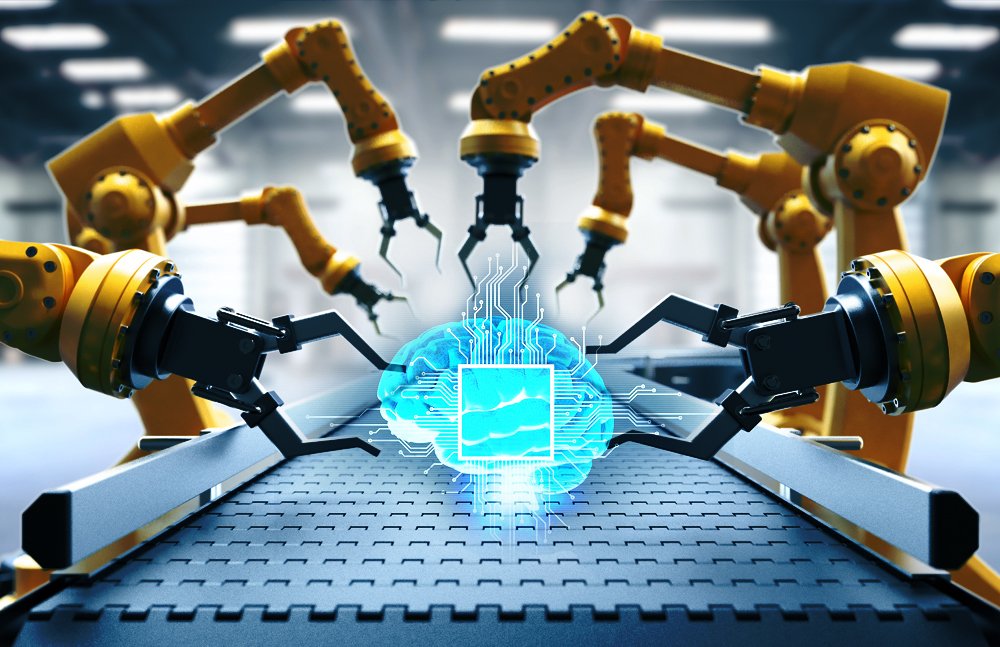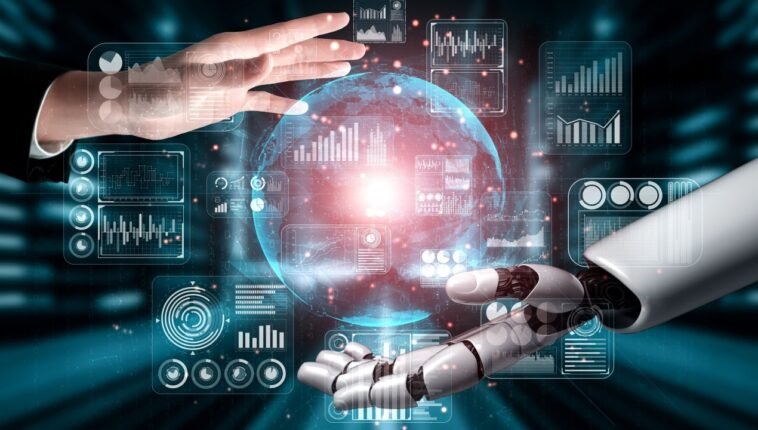Artificial Intelligence (AI) is rapidly transforming the business landscape, revolutionizing industries and reshaping the way we live and work. In 2023, AI continues to push the boundaries of what’s possible, driving innovation and opening up new opportunities for businesses across various sectors. From healthcare to finance, manufacturing to customer service, AI is playing a pivotal role in shaping the future. In this article, we’ll explore 15 of the best AI innovations that are making a significant impact on business and technology in 2023.
Read more: 15 Most popular Internet of Things technologies in 2023
AI in Healthcare
Table of Contents

AI is revolutionizing healthcare by enabling advanced diagnostics, personalized medicine, and virtual nursing. AI-assisted diagnostics systems can analyze medical images and data to detect diseases with remarkable accuracy, helping doctors make faster and more accurate diagnoses. Precision medicine leverages AI algorithms to develop tailored treatment plans based on an individual’s genetic makeup and medical history. Virtual nurses provide round-the-clock monitoring and support, improving patient care and reducing hospital readmissions.
AI in Finance
The finance industry is harnessing the power of AI to enhance fraud detection, automate trading strategies, and deliver personalized banking experiences. AI algorithms can quickly analyze vast amounts of financial data to detect fraudulent transactions and identify patterns indicative of potential scams. Algorithmic trading relies on AI-powered systems that execute trades based on predefined rules and market conditions, enabling faster and more efficient trading. Personalized banking utilizes AI to offer tailored financial advice and customized recommendations based on an individual’s financial goals and preferences.
AI in Manufacturing

In the manufacturing sector, AI is revolutionizing operations with smart factories, predictive maintenance, and supply chain optimization. Smart factories leverage AI and IoT technologies to automate and optimize production processes, leading to increased efficiency and reduced costs. Predictive maintenance uses AI algorithms to analyze sensor data and predict equipment failures, enabling proactive maintenance and minimizing downtime. AI-powered supply chain optimization systems optimize inventory levels, demand forecasting, and logistics, ensuring smooth operations and efficient delivery.
AI in Customer Service
Customer service experiences significant improvements with the integration of AI technologies such as chatbots, sentiment analysis, and personalized recommendations. Chatbots and virtual assistants provide instant support and information to customers, reducing response times and improving overall satisfaction. Sentiment analysis algorithms analyze customer feedback and social media data to gauge sentiment and identify potential issues. AI-powered recommendation systems use customer data to offer personalized product recommendations, enhancing the shopping experience and increasing sales.
AI in Transportation
Transportation is undergoing a revolution with the adoption of AI-powered technologies like autonomous vehicles, traffic management systems, and predictive maintenance for fleets. Autonomous vehicles are equipped with AI algorithms that enable them to navigate and make decisions on the road, promising increased safety and efficiency. Traffic management systems leverage AI to analyze real-time data and optimize traffic flow, reducing congestion and improving transportation networks. Predictive maintenance for fleets utilizes AI to monitor vehicle performance and predict maintenance needs, ensuring optimal fleet operations.
AI in Agriculture

The agricultural industry is leveraging AI to improve crop monitoring, enable precision farming, and enhance productivity. AI-powered systems can analyze data from sensors, satellites, and drones to monitor crop health, detect diseases, and optimize irrigation and fertilization. Precision farming techniques utilize AI to analyze soil data and weather patterns, enabling farmers to make data-driven decisions regarding planting, harvesting, and resource allocation. Drones equipped with AI capabilities can survey large areas of farmland, identify problem areas, and assist in crop monitoring and management.
AI in Education
AI is transforming education by enabling personalized learning experiences, intelligent tutoring systems, and adaptive assessments. Personalized learning platforms leverage AI algorithms to deliver customized educational content and adapt to individual students’ needs and learning styles. Intelligent tutoring systems use AI to provide personalized guidance and support, helping students grasp complex concepts and improve their academic performance. Adaptive assessments utilize AI to analyze student responses and tailor questions based on their individual proficiency levels, providing more accurate and targeted assessments.
AI in Retail
The retail industry benefits from AI innovations such as inventory management systems, dynamic pricing algorithms, and virtual shopping assistants. AI-powered inventory management systems leverage data analytics and machine learning to optimize inventory levels, reduce stockouts, and minimize carrying costs. Dynamic pricing algorithms analyze market trends, competitor pricing, and customer behavior to set optimal prices that maximize revenue. Virtual shopping assistants powered by AI use natural language processing and machine learning to provide personalized product recommendations and assist customers in finding the right products.
AI in Cybersecurity
Cybersecurity is enhanced through AI technologies like threat detection systems, behavioral biometrics, and automated security systems. AI-powered threat detection systems can analyze network traffic, detect anomalies, and identify potential security breaches in real time. Behavioral biometrics utilize AI algorithms to analyze user behavior patterns and detect unauthorized access attempts. Automated security systems leverage AI to autonomously respond to threats, adapt defenses, and mitigate risks, ensuring robust protection against cyber threats.
AI in Energy
The energy sector is adopting AI for smart grids, energy optimization, and renewable energy management. Smart grids equipped with AI technologies can balance energy supply and demand, optimize distribution, and facilitate integration of renewable energy sources. Energy optimization systems leverage AI algorithms to analyze energy usage patterns, identify inefficiencies, and recommend energy-saving measures. AI-powered solutions for renewable energy management enable efficient monitoring, forecasting, and optimization of renewable energy sources, contributing to a sustainable and clean energy future.
AI in Entertainment
AI is revolutionizing the entertainment industry by enabling content creation and curation, recommendation systems, and virtual reality experiences. AI algorithms can generate and curate content across various media formats, including music, video, and written content, enabling efficient production and personalized consumption experiences. Recommendation systems powered by AI analyze user preferences and behaviors to offer personalized content suggestions, enhancing user engagement and satisfaction. Virtual reality experiences driven by AI technologies provide immersive and interactive entertainment experiences, blurring the line between the physical and digital worlds.
AI in Logistics
Logistics operations benefit from AI innovations like route optimization, warehouse automation, and last-mile delivery solutions. AI-powered route optimization systems analyze factors such as distance, traffic conditions, and delivery constraints to determine the most efficient routes for transportation, reducing costs and delivery time. Warehouse automation utilizes AI technologies such as robotics and computer vision to streamline order fulfillment processes, improving efficiency and accuracy. Last-mile delivery solutions leverage AI algorithms to optimize delivery routes, coordinate drivers, and ensure timely and cost-effective deliveries.
AI in Marketing
Marketing strategies are enhanced through AI-powered predictive analytics, customer segmentation, and campaign optimization. Predictive analytics models powered by AI can analyze vast amounts of customer data to predict future behavior, enabling targeted marketing campaigns and personalized messaging. Customer segmentation powered by AI algorithms categorizes customers based on their preferences, demographics, and behaviors, enabling businesses to tailor marketing efforts to specific target audiences. AI-powered campaign optimization systems continually analyze campaign performance, adjust parameters, and optimize targeting to maximize conversions and ROI.
AI in Real Estate
The real estate industry is embracing AI technologies for property valuation, personalized property recommendations, and virtual property tours. AI-powered property valuation models utilize machine learning algorithms to analyze historical data, market trends, and property attributes, providing accurate and data-driven property valuations. Personalized property recommendation systems leverage AI to analyze customer preferences, budgets, and location data to offer tailored property recommendations, improving the home-buying experience. Virtual property tours powered by AI and virtual reality technologies enable potential buyers to explore properties remotely and visualize spaces in an immersive and interactive way.
Read more: Exploring the World of artificial intelligence in 2023
Conclusion
Artificial Intelligence is revolutionizing business and technology in 2023. From healthcare to finance, manufacturing to customer service, AI innovations are driving efficiency, improving decision-making, and delivering personalized experiences. As AI continues to evolve, businesses that embrace these technologies will gain a competitive edge and shape the future of their industries. The potential of AI is vast, and its impact will only continue to grow as businesses leverage its capabilities to transform and adapt to the ever-changing digital landscape.
FAQs
Can AI completely replace human workers?
AI has the potential to automate certain tasks and roles, but it is unlikely to completely replace human workers. AI excels at repetitive and data-driven tasks, but human creativity, critical thinking, and emotional intelligence remain crucial in many areas.
How secure is AI technology?
AI technology is as secure as the measures implemented to protect it. Like any technology, AI can be vulnerable to cybersecurity threats. However, with proper security protocols and robust defense mechanisms, AI systems can be safeguarded against potential risks.
Are there any ethical concerns related to AI?
AI raises ethical concerns such as privacy, bias, and job displacement. It’s important to develop AI systems with transparency, accountability, and fairness in mind, ensuring that AI is used responsibly and for the benefit of society as a whole.
How accessible is AI technology for small businesses?
AI technology is becoming increasingly accessible for small businesses, thanks to cloud-based services, open-source frameworks, and AI platforms tailored for different industries. Small businesses can leverage pre-built AI tools or partner with AI service providers to integrate AI into their operations.
What are the challenges of implementing AI in various industries?
Implementing AI in different industries may face challenges such as data quality and availability, integration with existing systems, employee upskilling, and regulatory compliance. Overcoming these challenges requires careful planning, collaboration, and a clear understanding of the specific industry’s needs and constraints.




